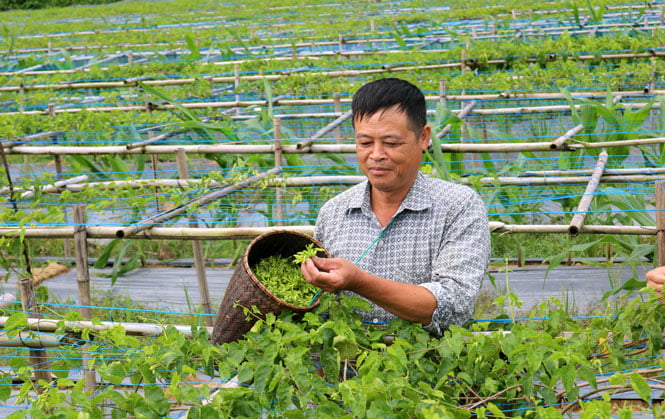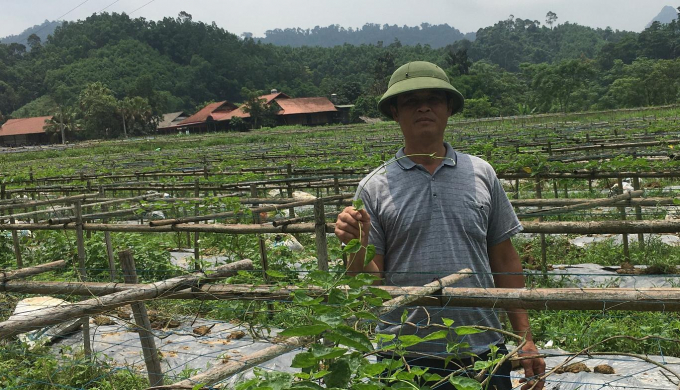May 21, 2025 | 07:25 GMT +7
May 21, 2025 | 07:25 GMT +7
Hotline: 0913.378.918
May 21, 2025 | 07:25 GMT +7
Hotline: 0913.378.918

Tonkin creepers' price always ranges from 40,000 to 60,000 VND/kg. It is easy to sell, so many households are encouraged to invest in planting this flower. Photo: DV.
Vu Chan is a highland commune in the mountainous district of Vo Nhai, Thai Nguyen province, populated mainly by ethnic minorities. In recent years many households here have made remarkable breakthroughs in converting crops and livestock with high economic efficiency, notably the Tonkin creepers growing model of Mr. Hoang Son Thang, Dong Dinh village.
Mr. Thang's renovation of rice fields and his investment of nearly VND 100 million to plant over 1,500 natural roots have truly piqued the interest of people in the area. In Vo Nhai, if asked about the Tonkin creepers model, almost everyone will know the directions because it is a very new model for the locals.
Taking us to visit his flower fields, Mr. Thang excitedly said that recently he had the opportunity to visit some friends who were his comrades during the time in service of the army in Nghe An and Hai Duong provinces, and was led to see some Tonkin creepers growing models. Mr. Thang found this to be an easy plant to grow, with a good market and high efficiency. After that trip, he returned to learn from experience and bought seedlings to plant in his hometown.
According to Mr. Thang, the Tonkin creeper is easy to grow and take care of. It is a perennial plant, so once flowers are harvested after 4 months of planting, the harvest time can last up to 6 months/year. Tonkin creepers' price on the market currently ranges from VND 40,000 to 60,000/kg and is very easy to sell. Another advantage is that the plant is easy to propagate from the stem, so the farmer can completely self-manage the seedling to expand the growing area.

Mr. Hoang Son Thang is loved by the Tay people in Vu Chan for his unique but effective model. Photo: Dong Van Thuong.
Mr. Hoang Son Thang said: "In reality, investment in Tonkin creepers is not that high, the sticks for the trellis are all available from households, seedlings can also be self-sufficient. The most important technique is making high beds to prevent flooding. In terms of effectiveness, the yield is from about VND 30-32 million/360 m2/year, while two rice crops, if put into comparison, only yield VND 1.4 million/360 m2/year."
Realizing the economic potential of Tonkin creepers, four households in Dong Dinh and two in La Cang hamlet followed Mr. Thang and converted rice land to Tonkin creepers with a total area of about 5 acres.
Mr. Hoang Van Hoan, 44 years old, said his family renovated 3 acres of rice land to grow Tonkin creepers and are placing a lot of hope in this new crop. The households are focusing on learning organic production techniques: the water used for irrigation is well water, pesticides are made from herbal preparations. Thanks to this care method the villages' Tonkin creeper is considered a precious specialty vegetable, with high demand.
With their current goal of improving production capacity and increasing competitiveness in the market, households have established a cooperative group to proactively innovate production methods, comply with the farming process under VietGAP standards, be environmentally friendly and create high-quality Tonkin creeper products. Vu Chan commune is building a brand for the "Dong Dinh Tonkin creeper" which has the potential to open a sustainable path for farmers in the region.
Translated by Nguyen Hai Long

(VAN) Japan's grant aid project contributes to capacity building, promoting organic agricultural production, and fostering sustainable community development in Dong Thap province.

(VAN) For years, the CRISPR-Cas9 genome technology has been reshaping genetic engineering, a precision tool to transform everything from agriculture to medicine.

(VAN) Vietnam aims to become a 'leader' in the region in the capacity and managing effectively soil health and crop nutrition.
![Reducing emissions from rice fields: [Part 1] Farming clean rice together](https://t.ex-cdn.com/nongnghiepmoitruong.vn/608w/files/news/2025/05/05/z6509661417740_a647202949c539012a959e841c03e1d3-nongnghiep-143611.jpg)
(VAN) Growing clean rice helps reduce environmental pollution while increasing income, allowing farmers to feel secure in production and remain committed to their fields for the long term.
/2025/05/19/5136-1-144800_230.jpg)
(VAN) The Nghe An Provincial People's Committee has just approved the list of beneficiaries eligible for revenue from the Emission Reductions Payment Agreement (ERPA) in the North Central region for the year 2025.

(VAN) 14 out of 35 domesticated elephants in Dak Lak province have had their living conditions improved, with 11 of them currently participating in the non-riding elephant tourism model.

(VAN) Muong Nhe Nature Reserve hopes that being upgraded to a national park will lay the foundation for forest protection efforts to be carried out in a systematic, modern, and sustainable manner.